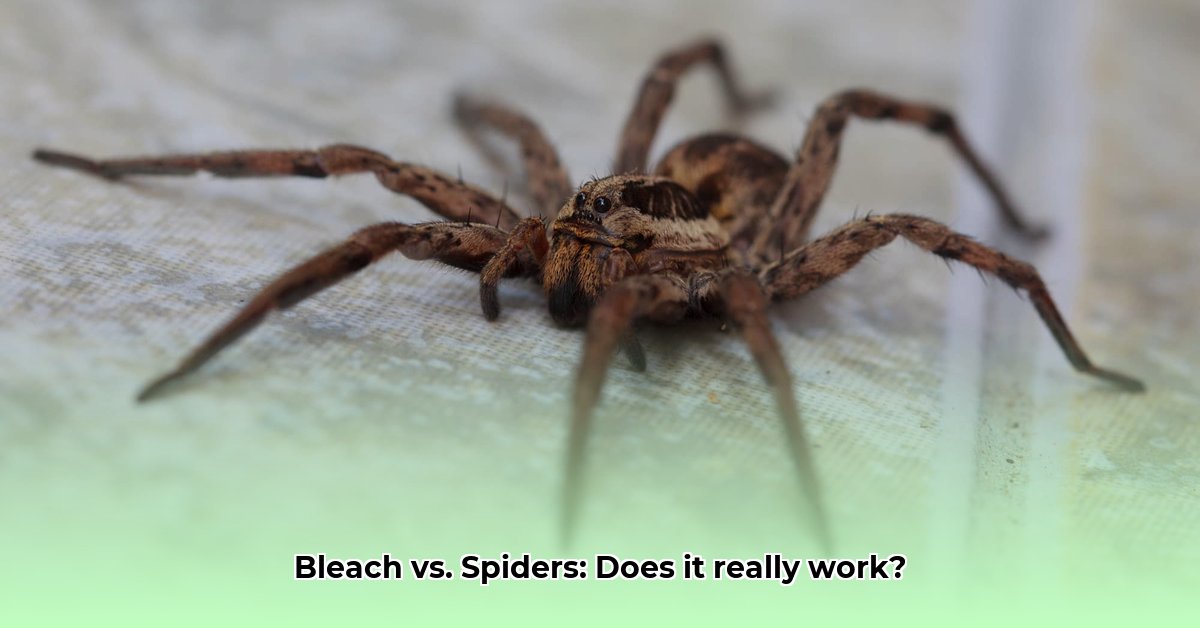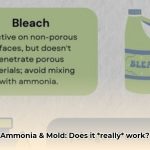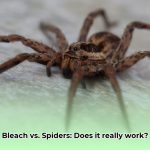Yes, bleach can kill spiders. But should you use it? Probably not. While it might seem like a quick and easy solution, bleach is far from ideal for spider control. It’s a bit like using a flamethrower to kill a mosquito – overkill, potentially dangerous, and likely to cause more problems than it solves. This guide dives into the science of how bleach affects spiders, the safety concerns involved, and—most importantly—much more effective and safer alternatives for managing these eight-legged creatures.
Why Bleach Isn’t the Best Spider Killer
While bleach’s corrosive properties can harm spiders, it’s often ineffective and poses several risks. Let’s explore why it’s not the best tool for the job.
How Bleach Can Kill Spiders (But Probably Won’t)
Bleach, specifically its active ingredient sodium hypochlorite, can affect spiders in two main ways:
- Suffocation: Sodium hypochlorite disrupts respiration, potentially suffocating the spider.
- Corrosive Damage: Bleach can damage a spider’s exoskeleton, much like a chemical burn.
However, several factors limit bleach’s effectiveness:
- Spiders are Fast: They’re likely to scurry away before you can drench them with bleach.
- Direct Contact is Necessary: Bleach must directly contact the spider to be effective. A near miss won’t do much.
- Egg Sacs are Resistant: Bleach may not penetrate spider egg sacs, allowing eggs to hatch even after you’ve sprayed the area.
The Dangers of Using Bleach for Spider Control
Using bleach for pest control poses significant safety risks:
- Respiratory Irritation: Bleach fumes can irritate your lungs, especially for those with asthma or other respiratory conditions.
- Skin and Eye Irritation: Bleach can cause skin burns and eye damage upon contact.
- Surface Damage: Bleach can discolor or damage fabrics, carpets, and other materials.
- Toxicity to Pets and Children: Bleach is toxic if ingested and can be harmful to pets and children even through skin contact or inhalation.
Safer and More Effective Spider Control Alternatives
Fortunately, there are many safer and more effective ways to deal with spiders than resorting to bleach.
Natural Spider Repellents
- Vinegar: A solution of equal parts white vinegar and water can deter spiders. Some experts suggest that spiders dislike the strong acetic acid smell.
- Essential Oils: Peppermint, tea tree, lavender, and citrus oils are often cited as natural spider repellents. Mix a few drops with water and spray around potential entry points. Research on their effectiveness is ongoing, but they offer a safer alternative to harsh chemicals.
- Diatomaceous Earth (Food Grade): This natural powder damages a spider’s exoskeleton, leading to dehydration. Sprinkle it in cracks, crevices, and along baseboards. Make sure to use food-grade diatomaceous earth, as other types can be harmful if inhaled.
Physical and Chemical Controls
- Spider Traps: Sticky traps placed strategically can passively catch spiders.
- Insecticides: Choose insecticides specifically labeled for spider control. Always follow the instructions carefully and ensure proper ventilation. Consider the potential impact on pets and children.
- Vacuuming: Regularly vacuuming removes spiders, webs, and egg sacs.
Professional Pest Control
For severe infestations or if you suspect venomous spiders, contact a qualified pest control professional. They have the expertise and tools to handle the situation safely and effectively. Many professionals now utilize Integrated Pest Management (IPM) strategies, focusing on long-term prevention and minimizing pesticide use.
How to Apply Bleach (A Last Resort – Seriously, Don’t)
If you absolutely must use bleach, follow these precautions:
- Dilute: Mix one part bleach with nine parts water.
- Ventilate: Open windows and doors to ensure adequate ventilation.
- Protect Yourself: Wear gloves, eye protection, and a mask.
- Test Surfaces: Test the diluted bleach on an inconspicuous area to check for discoloration or damage.
- Target Carefully: Apply directly to the spider or its web, avoiding widespread spraying.
- Clean Up: Wipe down the area thoroughly after application.
Preventing Spiders: A Proactive Approach
The best way to control spiders is to prevent them from entering your home in the first place.
- Seal Entry Points: Caulk cracks and crevices around windows, doors, and pipes.
- Reduce Clutter: Spiders love hiding places. Keeping a clean and organized home minimizes potential harborage areas.
- Exterior Lighting: Minimize outdoor lighting near entrances, as it can attract insects that spiders prey on.
- Landscaping: Trim bushes and vegetation away from your house to reduce spider activity near your foundation.
The Importance of Spiders in the Ecosystem
While they might give us the creeps, spiders play a crucial role in the ecosystem. They are natural predators of many insect pests. If possible, consider relocating spiders outdoors rather than killing them.
Choosing the Right Spider Control Method
| Method | Effectiveness | Safety | Eco-Friendliness |
|---|---|---|---|
| Bleach | Low | Low | Low |
| Vinegar/Essential Oils | Medium (Further research needed) | High | High |
| Diatomaceous Earth | Medium to High | High | High |
| Spider Traps | Medium to High | High | Medium |
| Insecticides | High | Medium | Variable |
| Vacuuming | Medium | High | High |
| Professional Pest Control | High | High | Variable |
By understanding the downsides of bleach and exploring the many safer and more effective alternatives, you can create a spider-free home without putting yourself, your family, or the environment at risk. Remember, a little prevention goes a long way!
- Does Ammonia Kill Mold? The Truth About Using It for Removal - April 15, 2025
- Does Bleach Kill Spiders? Effectiveness, Safety, and Better Alternatives - April 15, 2025
- Does Soap Expire? How to Tell if Your Soap Has Gone Bad - April 15, 2025










